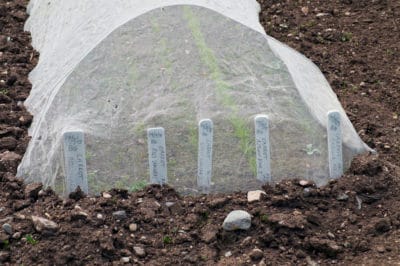How Carrot Fly Attacks Your Crop
Carrot flies are attracted by the strong aroma given off by your growing plants, particularly carrots. Mature flies lay eggs on the ground around your growing carrots. When these eggs hatch, the emerging larvae make their way underground and into your crop’s roots. Since these maggots are small – generally less than half an inch long – they are usually able to do their burrowing unnoticed.
Once the carrot fly larvae reach your plants, they burrow under the skin of the root and start eating. This is where the damage from these creatures gets bad; root damage can kill your carrots!
How to Tell if You Have a Carrot Fly Problem
You’ll normally see a surge in carrot fly eggs in mid-spring and again in mid-summer. Since the larvae are small, and the adults tend to blend in with other flying insects, you want to be aware of the signs of carrot fly larvae infestation. These include:
- Wilted foliage
- Discolored leaves, ranging from rust to red, and occasionally yellow
- Brown tunnels under the skin of your carrot’s roots
- Small, cream-colored maggots in your carrot patch
Prevention is the Best Medicine
It’s better to prevent carrot fly infestation than trying to address it after the fact. The focus is keeping the adult flies from laying their eggs in your carrot patch, as well as discouraging egg layers.
Companion plants such as onions, garlic, and chives will cover the enticing aroma of carrots with their own smells. This will steer the adult carrot fly away from your garden. Rosemary, sage, and marigold are also thought to deter carrot flies.
Carrot flies also like parsley, turnips, and celery; plant these far from your carrots and use companion plants with them. This can significantly reduce the chance of your garden becoming a carrot fly breeding ground.
Erecting a fine-mesh type barrier or, better yet a cage, at least two feet tall, around and over your plants will help keep the female from leaving her eggs near your carrots. Be sure the bottom of your barrier touches the ground or buried slightly, as larvae hatch on the ground so they will not be able to crawl to your carrots.
To kill these little critters organically, you can buy beneficial nematodes to add to your garden; these will kill the invading larvae without damaging your plants or adding chemicals to your crop.
